GC3: Where to next?
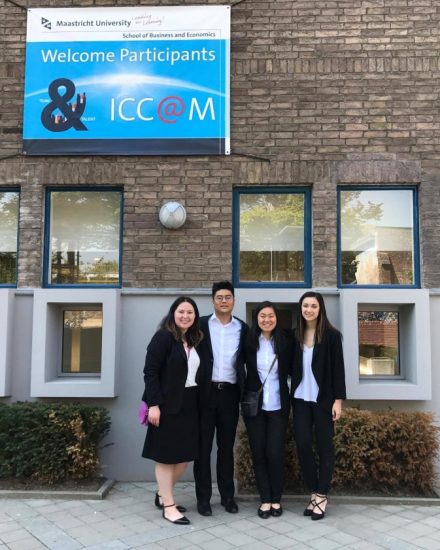
As the Global Case Competition Club begins its fourth year, we caught up with GC3 founders and Foster alumni Emmeline and Tara to discuss their inspiration for starting the club, long-term visions and how they’ve carried their case competition experience into their careers and post-graduate lives.
What prompted you to start GC3?
After competing in Thailand together our sophomore year, it was clear that other universities had dedicated trainings and communities to case competitions, which allowed them to learn, connect, and collaborate. We wanted to do the same for UW.
What did you envision for the club? Did it meet those expectations?
Long-term, we envisioned creating a community where people could learn from one another, pull together resources, and level-up Foster’s competitiveness on a global scale. The value of learning from peers of different skill-sets and years in school was important. Coming into it, we understood that this wouldn’t happen immediately. We think the first year created a foundation and conversation about how this would best look, and are confident that the future leaders of the club will continue this effort!
What challenges did you encounter with the formation and promotion?
The biggest challenge was building a curriculum of relevant content, which then directly impacted retention. We started out with no specific guidelines for members, and so adapting to so many levels and learning styles – from 5th year seniors to students who didn’t know what a case competition was – was difficult.
what a case competition was – was difficult.
What benefits do you feel that GC3 and case competitions bring to the Foster school and its students?
People learn in different ways, and case competitions are a great way to adapt to that! You’re able to exercise a different part of your mind by applying what you learn in the classroom into practice. Additionally, getting to work with and learn from others in this space is invaluable. GC3 simply helps provide extra opportunities and resources for these kinds of hands-on experiences.
What advice would you offer current case competitors?
Diversity of thought matters; getting people of different specialties, expertise, and different years in school makes for the best learning experience. Also, when attacking the problem, make sure you’re answering the actual question (instead of diving in too fast); it’s helpful to set aside time to outline the deliverables and asks from the case description before you divide and conquer.
What’s one part of case competitions that you miss? One part that you don’t?
We both miss getting to connect with so many different types of people we otherwise would not have. On a global scale, we met so many incredible people from around the world, but ultimately UW case competitions are how we became friends and became so close.
We don’t miss the insomnia that may come from balancing cases with school, work, personal life, and everything in between. Still, that kind of balancing act is quite the crash course when it comes to time management.
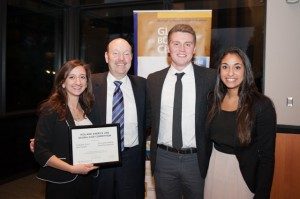 What’s your favorite memory from a case competition?
What’s your favorite memory from a case competition?
We were in Thailand for our first international case comp — a 30-hour case in which we weren’t allowed to leave the hotel room. It was down to the last 3 minutes before the buzzer beater. The room reeked of leftover McDonald’s and Thai food (we invented the McBangkok, which was composed of a Big Mac and pad Thai), our other two teammates were fast asleep, and the ambassadors were standing in the corner anxiously waiting for us to hand over the USB with the final presentation on it. Tara finished up her last slides, saved it on the USB, literally threw the USB across the room to me, and I quickly hyperlinked the last 10 slides of our appendix before handing it to the ambassadors in the last 5 seconds of the timer. This was the moment where case competitions met sports.
How do you feel your case competition experience has helped you in your career?
Tara: In many ways, case competitions are like abbreviated strategy consulting engagements. You’re given a high-level issue and it’s your job to turn the ambiguity into an insightful, credible, and clear recommendation. Though case comps are often intimidating at first — summarizing and pitching hours of research in front of a panel of very intelligent judges can be nerve racking — I think case comps were the perfect environment for me to practice and gain confidence in my ability to craft and tell a concise yet engaging storyline. Overall, Case competitions are a great low-stakes environment to ramp up to presenting and fielding questions in high-stakes, client-facing environments after college.
Emmeline: I work in Product Marketing now and several members of my team are actually ex-consultants! With Product Marketing, you’re managing the outbound aspect of a product from front to end, including research, positioning, and the overall go-to-market strategy. My experience with case competitions helped me to look at things holistically in that aspect and always search for the “so what” in every piece of insight. It’s one thing to discover a piece of data through research, but to be able to then turn that into an actionable insight that you can implement into the product — that’s what makes a great PMM. I’m definitely still developing this skill set, but case comps were my first exposure into this type of work.
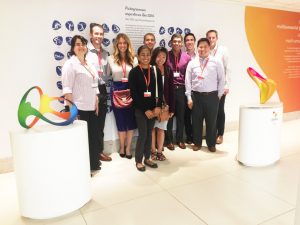 How do you feel your case competition experience has helped you in everyday life?
How do you feel your case competition experience has helped you in everyday life?
Tara: Undeniably, case comps help you become a better communicator, and not just in front of a panel of judges. Case competitions have a lot of social complexity — you have a group of people with different communication styles, viewpoints, skill-sets, and backgrounds. As a result, teammates don’t always see eye-to-eye, especially because there are many “right” approaches to a single case. My experience with case competitions helped me develop a mindset of building on the thoughts and ideas of others, in contrast to shutting down an approach that I don’t fully agree with. I think finding common ground is important for any relationship, in both personal and professional environments, and has ultimately made moments misalignment with others become easier to navigate.
Emmeline: One of my biggest takeaways was getting the experience to meet/work with so many different people and understand how others learn, work, and find motivation in their own way. I recently had to take the Strengthsfinder assessment for work and my #1 strength was “individualization” — which, in other words, means looking at and valuing people for their unique strengths and characteristics. I really feel like my experiences with case competitions helped develop this in me. It was incredibly eye-opening to work side by side with so many different types of personalities and work styles in my 4 years at UW.
Please share any other case competition related tidbits you might have!
We want to give a big shout out to Kathleen Hatch because she is a major reason why we were able to start-up the GC3 community. It’s pretty special to have a faculty member on your side who’s so intentional, supportive, and passionate. She has – and still does – put in so much of her free time into GC3 simply because she cares about students.
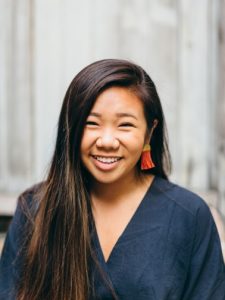 Emmeline
Emmeline
Emmeline currently resides in San Francisco (with Tara… the two can’t seem to separate). She is an Associate Product Marketing Manager at LinkedIn, where she works on products that support the small business community specifically. Part-time, she is pursuing her Master’s degree at USC and does various photography gigs on the side. When she’s not working, studying, or photographing, you can find her at a cafe or in Seattle/LA hanging out with her big, goofy family.
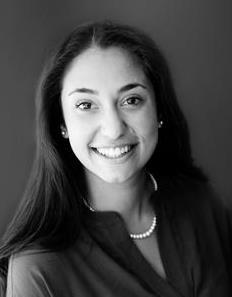 Tara
Tara
Upon graduating from the University of Washington’s Michael G. Foster School of Business and Honors Program, Tara started her career at Camber Collective, which is a social impact consulting firm that develops and implements strategies and programs to improve public health, to create new economic opportunities for underrepresented communities, and to maximize the effectiveness and funding of the philanthropic sector. As a Consultant, Tara has worked on global development strategy and research engagements across Burkina Faso, Bangladesh, Ethiopia, Nigeria, and India. She has also spent extensive time – both in her career and volunteering – pursuing her passions in a local context, primarily in youth education and mental health. In her free time, Tara enjoys backpacking, playing soccer, and working on her podcast.
The Global Case Competition Club (GC3) is a student-run organization that provides Foster students with valuable leadership opportunities, as well as the resources and skills needed to tackle even the most daunting of case competitions. To learn more about GC3, visit their website or email [email protected].
